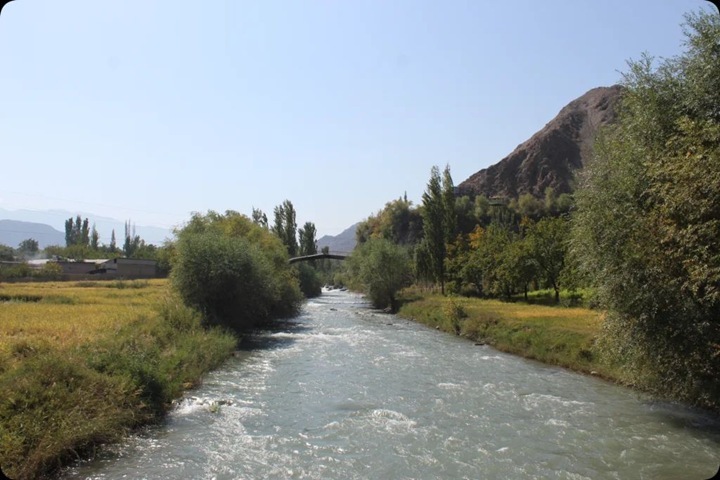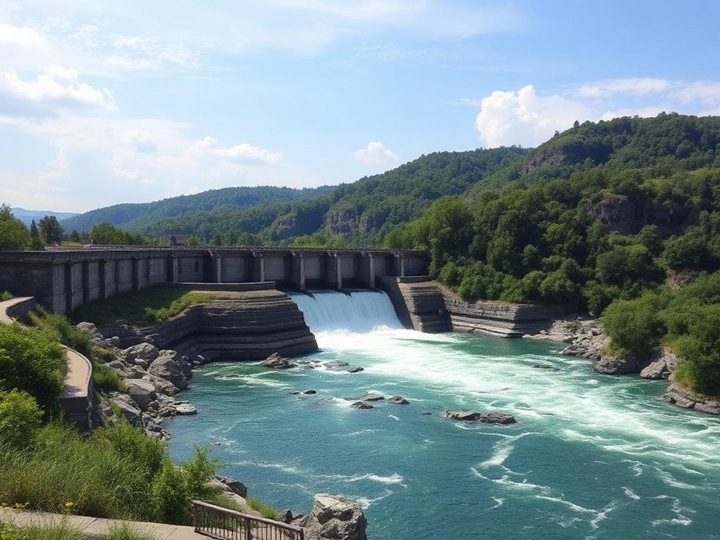Isfara will become the river of friendship of the Central Asian countries
From now on, residents of the border regions of Kyrgyzstan and Tajikistan will jointly use water and energy infrastructure facilities located on the border territories of the two countries. Kyrgyz President Sadyr Japarov signed a law ratifying the agreement with Tajikistan on March 26.

The agreement signed by the heads of Kyrgyzstan and Tajikistan on March 13, 2025 in Bishkek and approved by the Parliament of Kyrgyzstan guarantees unhindered access of both countries to water facilities, including the head dam with three gates and the head water intake structure of the Ak-Tatyr–Mastchoi canal on the transboundary Isfara River (or Ak-Suu is the Kyrgyz name of the river, originating on the Ak-Suu glacier), for their joint operation.
These objects were identified as part of the delimitation of the common section of the border. This was reported by the press service of the President of Kyrgyzstan.
It should be noted that seven large irrigation canals and dozens of small ditches have been built on the Isfara River.
Earlier, Kyrgyzstan and Tajikistan managed to agree on the joint management of the “Head” water intake, located on the same Isfara River. Speaking in Parliament, the head of the State Committee for National Security of the Kyrgyz Republic Kamchybek Tashiev explained the terms of the agreement on the water distribution facility. The parties received half of the three closures: Kyrgyzstan – one and a half hatches and Tajikistan – one and a half hatches, this is about 3-4 meters of territory. As compensation for part of the closure, Tajikistan transferred to Kyrgyzstan 500 hectares of land on the Unju-Bulak conflict site in the Chon-Alai district of the Osh region, as well as 150 hectares on the Katta-Tuz site and 100 hectares at the entrance to Sulukta. Tashiyev stressed that the use of water intake and water distribution will be regulated by bilateral agreements of the relevant departments of the two countries.
The Isfara River is a source of life for 400 thousand inhabitants of Tajikistan and Kyrgyzstan, not counting Uzbekistan, especially those employed in agriculture. Together with the Toktogul reservoir, built in Kyrgyzstan for transboundary use, the river ensures the well-being of a significant part of the population of these countries. Water supply, especially in the context of population growth and the development of new lands in the Fergana Valley, is of critical importance. It was because of land and water that the first major conflict broke out, as a result of which there were casualties and a curfew was imposed. It was in 1989. Over the past 36 years, border conflicts have become chronic, escalating from clashes with the use of stones and sticks to the use of heavy weapons, including artillery and aviation. Compliance with the agreements signed by the Presidents of the two countries on water allocation on the Isfara River is the key to peace and stability in Central Asia. Any violations could jeopardize the fragile balance in the region.
Tajik expert Negmatullo Mirsaidov called this decision expected. “I am pleased with the position of the parliament of the neighboring state and its president, who are consistent in making decisions on border issues. I am sure that the new Parliament of Tajikistan will soon ratify all the documents that the parties signed during the recent visit of the Tajik head of state to Bishkek,” Mirsaidov told Nezavisimaya Gazeta.
According to him, people living on the border of Tajikistan and Kyrgyzstan, politicians and experts understand that one demarcation and delimitation of borders, one Agreement on the state border, taking into account the presence of many and diverse problems, will not be able to finally stabilize the situation in the border area.
“There are issues of communications, both transport and irrigation, energy, exploitation of mineral deposits, use of water resources from the basin of transboundary rivers, since they are located beyond the border line. All these issues require a comprehensive solution, otherwise it is impossible to eliminate the ground for the emergence of new conflicts,” the expert believes. “Watershed issues are particularly important. In the conditions of climate change and reduction of water resources, especially in the small transboundary rivers Isfara and Khoja Bakirgan, which are located in the zone of recent conflicts, the risk of new conflicts remains. Therefore, the introduction of an effective watershed mechanism and control over compliance with the norms is relevant, and the ratified document acquires great importance from the point of view of preventing possible conflicts,” Mirsaidov stressed. The expert recalled that the geography of the Tajik-Kyrgyz border area is such that not only rivers cross each other’s territory, but also irrigation communications built during the USSR period, taking into account common interests, are transboundary in nature, that is, many of them supply water simultaneously to both Tajik and Kyrgyz lands.
Igor Shestakov, director of the Oi Ordo Center for Expert Initiatives, considers the Kyrgyz-Tajik agreement a potential model for resolving regional conflicts. The long-standing dispute between the two countries, which escalated after the collapse of the USSR, demonstrates the importance of water resources for regional stability. The implementation of the treaty can become an example not only for Central Asia, but also for other regions of the world.
“However, the signing of the agreement is only the first step. The upcoming parliamentary and presidential elections in Kyrgyzstan may lead to politicization of water use and land exchange issues. The government will need to show miracles of political acrobatics in order to convey to the population the importance of the agreements reached. Already today, the signed agreement between Kyrgyzstan and Tajikistan is being hotly discussed on social networks. Systematic explanatory work of the government and parliament is needed,” Igor Shestakov told Nezavisimaya Gazeta.
According to the political scientist, the agreement is also important for Uzbekistan, which plays a leading role in regional integration. “The successful resolution of the Kyrgyz-Tajik issue can contribute to strengthening Central Asian cooperation,” Shestakov believes.
Victoria Panfilova (Nezavisimaya Gazeta)


